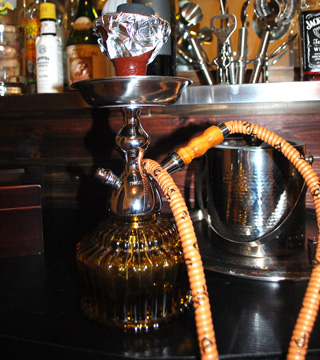Cough It Up

By Stephanie Guillen
Hookah lounges and bars will be coughing up a lot of money, now that new bills have passed to regulate the use of the popular pipes. Mayor Bill de Blasio signed three new laws last month, which will make things tough on hookah fanatics and shop owners in New York City.
Under the city’s Smoke-Free Air Act, no new hookah lounges and bars can be opened. Those already in business are required to have a special license, post warning signs on the health risks and dangers of smoking hookah, and prove that 50 percent of their revenue comes from hookah sales. Also, the minimum age to purchase hookah was raised from 18 to 21.
City lawmakers have expressed concerns about the dangers of smoking hookah for years but recent poisonings really shed light on how harmful smoking hookah could be. This past spring, a Washington Heights nightclub Mia Sushi & Steakhouse lost its liquor license after a patron was poisoned by a defective hookah, along with many other violent incidents. The man was foaming at the mouth, according to the State Liquor Authority and was taken to the hospital after losing consciousness. He was diagnosed with carbon monoxide poisoning. “Hookah was getting out of hand and it needed to be regulated,” says Manuel Lopez, former part-time lounge promoter, who agrees with the new laws.
 Hookahs are pipes with long, flexible tubes used to smoke flavored tobacco or shisha and they are a huge part of the city social scene, especially in Washington Heights. What makes them highly marketable is the misconception that they are safer than cigarettes. This makes hookah attractive to teens. The CDC’s National Youth Tobacco Survey found that from 2013 to 2014, hookah smoking roughly doubled for middle and high school students in the United States. The charcoal used to heat tobacco in the hookah increases the health risks by producing smoke that contains high levels of carbon monoxide, metals, and cancer-causing chemicals. A typical 1-hour-long hookah smoking session involves 200 puffs, while an average cigarette is 20 puffs and 45 minutes of smoking hookah is equivalent to smoking 120 cigarettes, according to Centers for Disease Control and Prevention.
Hookahs are pipes with long, flexible tubes used to smoke flavored tobacco or shisha and they are a huge part of the city social scene, especially in Washington Heights. What makes them highly marketable is the misconception that they are safer than cigarettes. This makes hookah attractive to teens. The CDC’s National Youth Tobacco Survey found that from 2013 to 2014, hookah smoking roughly doubled for middle and high school students in the United States. The charcoal used to heat tobacco in the hookah increases the health risks by producing smoke that contains high levels of carbon monoxide, metals, and cancer-causing chemicals. A typical 1-hour-long hookah smoking session involves 200 puffs, while an average cigarette is 20 puffs and 45 minutes of smoking hookah is equivalent to smoking 120 cigarettes, according to Centers for Disease Control and Prevention.
Like many of the restaurants that double as lounges and bars, Mama Sushi on Dyckman Street, sells hookah. Families, often with their children, frequent these venues, and although they have compromised by creating a smoking section, this does not seem to satisfy non-hookah smokers. “If you can’t smoke cigarettes in these places, hookah isn’t too far off,” said Tara McMahon, a Mama Sushi regular, who sees a bright side to the bill. “I don’t find the hookah smell offensive, as I do cigarettes, but sometimes you want to enjoy your meal and not have the table by you blowing smoke in your face.”
Other like Lucy Puca, executive chef at La Marina Restaurant & Lounge say the health risk are overblown. “At least hookah is recreational and you do it when you go out mostly, or in social settings and it is not addictive like nicotine,” she says. “I think it was some grouchy older bitter council person. Like everything else in our country, there are strange double standards. So many places will go out of business.”
There is no doubt that the bills will impact the revenue of these businesses. Hookah, in this decade, has become a part of the Uptown culture. Customers under 21 were able to purchase hookah. This increased sales, especially during non-peak hours. This created a consistent revenue flow during the early hours of business (usually slow) with appetizer and hookah sales from the after-school crowd.

“This bill is stripping people of their free will,” said Riki Santos, lounge manager at La Marina Restaurant & Lounge. “At 18 years of age, you should be able to make your own decisions. Everyone is aware of the damage that hookah can cause. I think it would have been fair to set some rules in, like restricting hookah to outdoor spaces only, or setting a time frame. For the people who have issues with hookah, there are plenty of venues that do not sell it, so you are not forced to go to a spot that sells hookah. It’s your personal decision.”
Others like former promoter, Manuel Lopez, says hookah is a niche market and should not be mixed in with restaurants. Unlike alcohol, hookah can impact patrons’ dining experience. “If you want that experience, you should go to a place that caters to that experience specifically. A restaurant or a lounge, is built for specific reasons, and those reasons don’t really have to do with hookah. If your lounge needs hookah to survive, you’re doing something wrong.”
Saved under Featured Slide, News
